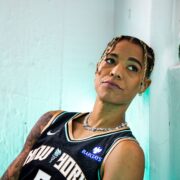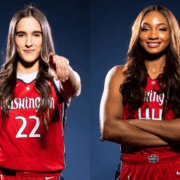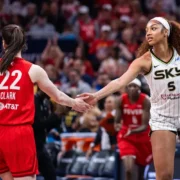The 2025 WNBA Draft was a night to remember—full of groundbreaking selections, international flavor, and a crystal-clear shift in the league’s future. From Paige Bueckers’ historic No. 1 overall selection to the rise of global prospects like Justė Jocytė and Dominique Malonga, the first round didn’t just meet expectations—it reshaped them.
Before the picks went down, I dropped a full 2025 WNBA Mock Draft breaking down the top 10 selections and their potential fits. It’s fun to look back at predictions, even if it can be off at times. Now that the real thing has happened, here’s a complete recap of the first round; with in-depth analysis on each player, how they fit their new teams, and why this class might go down as one of the most impactful in WNBA history.
1. Dallas Wings – Paige Bueckers (G, UConn)
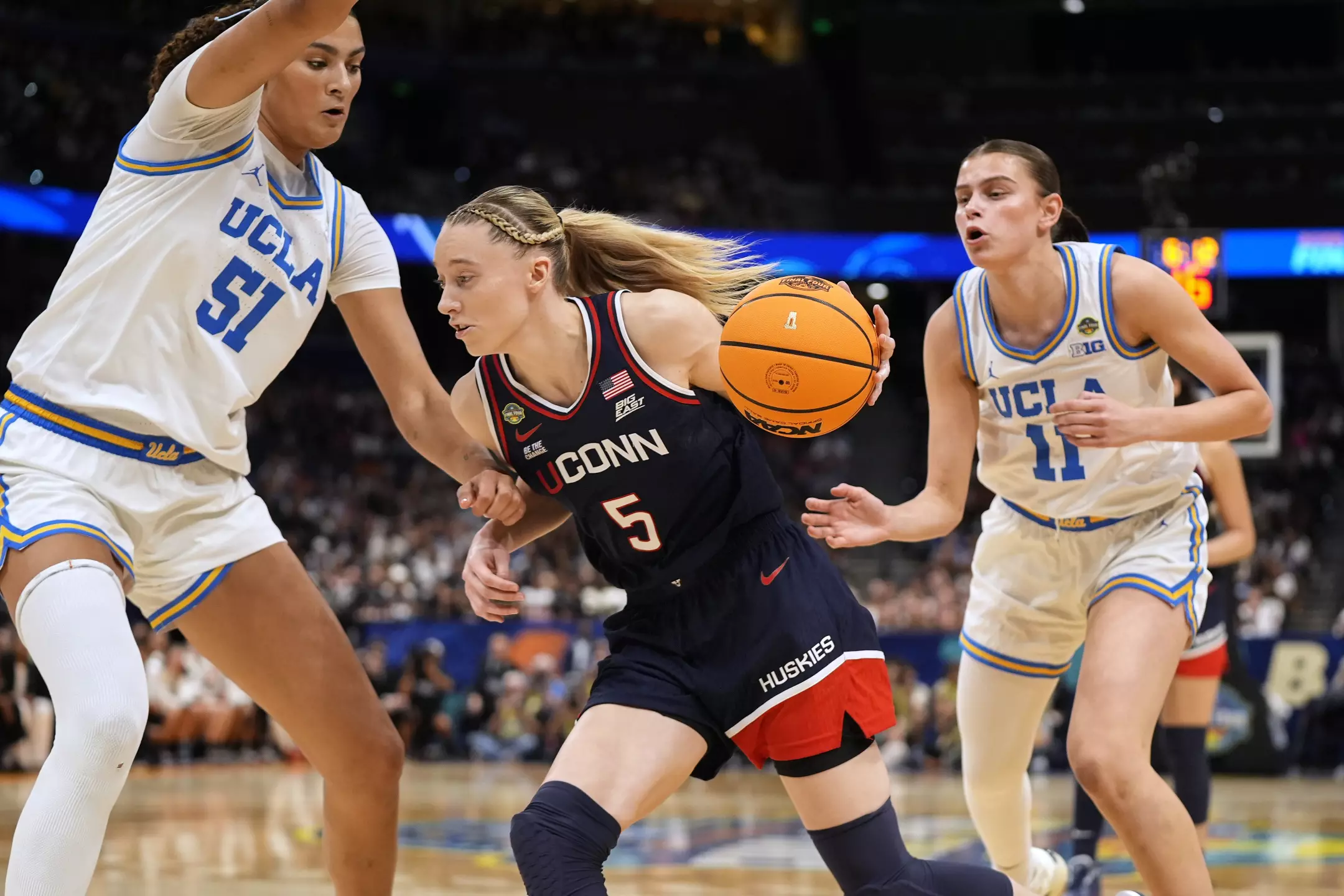
The Dallas Wings made a franchise-defining move by selecting Paige Bueckers with the No. 1 overall pick in the 2025 WNBA Draft. It’s a pick that not only injects star power into their roster but also signals a clear intent: the rebuild is over—it’s time to win.
Bueckers, fresh off a dominant NCAA title run with the UConn Huskies, enters the league as one of the most decorated and recognizable players in recent memory. From the moment she arrived in Storrs, she carried the weight of sky-high expectations and somehow still managed to exceed them. The 6-foot guard capped off her college career by averaging 21.8 points, 5.4 assists, and 2.1 steals per game in her senior season—all while shooting over 50% from the field. But the numbers only tell half the story.
What makes Paige Bueckers a generational talent isn’t just her ability to light up the scoreboard—it’s how she controls the flow of a game, how she makes her teammates better, and how she rises in big moments. Her basketball IQ, poise under pressure, and passing vision are elite. She’s not just a scorer—she’s a connector, a floor general, and a leader with an unshakable motor.
For the Dallas Wings, this is exactly what they’ve been missing. The Wings have a roster full of promising pieces—Arike Ogunbowale remains one of the most dynamic scorers in the league, and young talents like Satou Sabally and Teaira McCowan provide frontcourt strength. But what they’ve lacked is consistency at the point guard position and a true floor leader to tie everything together.
Enter Paige.
Bueckers fits perfectly into a Dallas backcourt that thrives on speed and creativity. Her ability to run the offense, space the floor, and find her shot within the flow of the game will be a massive upgrade. Pairing her with Ogunbowale gives the Wings one of the most explosive guard duos in the league—think of it as brains and buckets, finesse and firepower.
More than anything, Paige Bueckers brings hope. For a franchise still chasing its first championship, this pick could be the moment everything changes. With her leadership and winning pedigree, the Wings aren’t just building—they’re finally ready to compete.
2. Seattle Storm – Dominique Malonga (C, France)
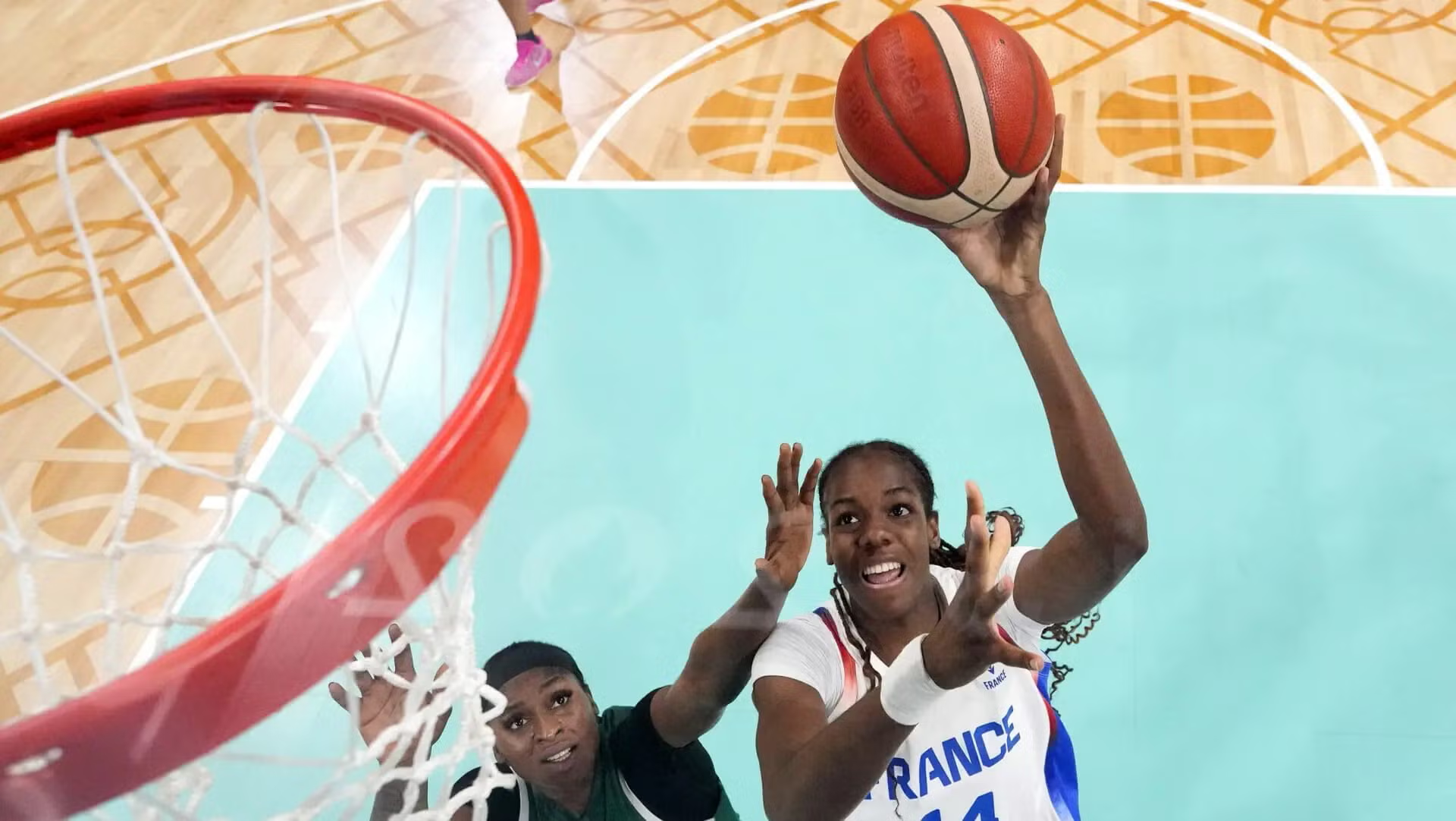
With the No. 2 overall pick in the 2025 WNBA Draft, the Seattle Storm made a bold, international statement by selecting Dominique Malonga, a 19-year-old French sensation out of ASVEL Féminin. While this pick may have surprised some fans unfamiliar with the European circuit, those who’ve followed Malonga’s rise know exactly why the Storm went all-in on her potential.
Standing at 6-foot-3 with an elite motor and a wingspan that alters shots with ease, Malonga is the epitome of modern post play. She’s fast, fluid, and fearless in the paint—an athletic center who thrives in transition, dominates the glass, and brings an edge to rim protection. In the French Ligue Féminine de Basketball and EuroCup Women, she’s already proven she can hold her own against grown pros, averaging double-doubles and flashing serious upside as a two-way threat.
Seattle, a team with a storied past and multiple WNBA championships under its belt, is currently in a retooling phase. With Breanna Stewart and Sue Bird gone, the franchise has been searching for new anchors to carry them into the next era. Malonga isn’t just a long-term investment—she could become the Storm’s defensive identity from day one.
On a roster that features Jewell Loyd, one of the best scoring guards in the league, and young pieces like Jordan Horston and Mercedes Russell, Malonga brings something unique: interior dominance with international polish. She doesn’t just block shots—she times them. She doesn’t just rebound—she reads the ball off the rim like a veteran. Her footwork is refined, and her energy is contagious.
Beyond her skill set, Dominique Malonga represents the WNBA’s growing global reach. Her selection continues the trend of international players making big waves in the draft, and her journey from France to the U.S. will be one to watch closely. It’s a move that blends talent with global marketability, giving Seattle both an elite prospect and a bridge to international fans.
The Storm aren’t just thinking about the now—they’re building something sustainable, and Dominique Malonga could be the cornerstone of that future. Give her time, and Seattle may have just landed the next big thing in women’s basketball.
3. Washington Mystics – Sonia Citron (G, Notre Dame)
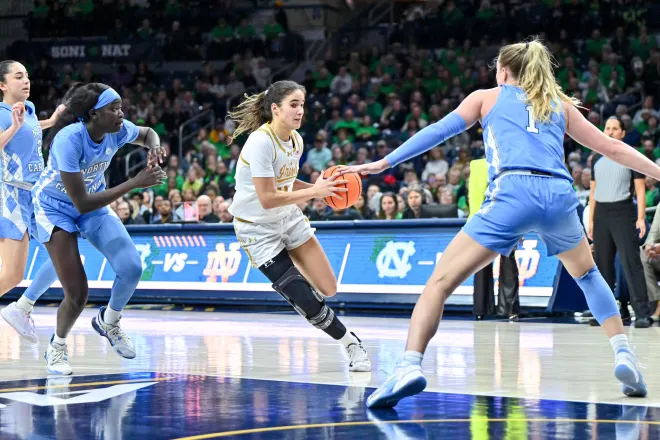
With the No. 3 overall pick in the 2025 WNBA Draft, the Washington Mystics made a savvy and strategic move by selecting Sonia Citron, the do-it-all guard from Notre Dame. Known for her versatility, smooth offensive game, and stifling perimeter defense, Citron is exactly the kind of two-way talent that can elevate a team on both ends of the floor.
At 6’1″, Citron brings size, length, and agility to the guard spot—a rare combination that immediately makes her a matchup problem for opposing backcourts. She’s a Swiss Army knife player, capable of running the offense, knocking down shots from midrange and beyond the arc, slashing to the basket, and most importantly, locking up the other team’s best perimeter scorer. Her instincts on defense are elite. She anticipates passing lanes, rotates on help defense, and competes with a gritty, high-IQ motor that coaches dream about.
During her junior season at Notre Dame, Citron averaged 17.2 points, 6.5 rebounds, and 4 assists per game, all while serving as the heart and soul of the Fighting Irish. She was consistently tasked with defending the other team’s top guard while also being the primary scoring option—an elite responsibility she handled with maturity beyond her years.
For the Washington Mystics, who are navigating a transitional period following years of postseason contention, Citron is a perfect foundational piece. The Mystics already have a strong veteran presence in Elena Delle Donne (if she returns to full form) and rising star Shakira Austin, and Citron adds a reliable backcourt presence who can grow into a franchise cornerstone.
She also fits into Washington’s system from a culture standpoint. The Mystics under head coach Eric Thibault value toughness, smart team basketball, and players who make winning plays. Citron checks every box. Whether she’s coming off a screen for a pull-up jumper, diving for a loose ball, or setting up teammates with crisp passes, she makes things happen without needing to dominate the ball.
In a draft full of flashy scorers and international standouts, Sonia Citron is the kind of glue player that championship teams are built around. She doesn’t need hype—her game speaks volumes. And in D.C., it’s about to get even louder.
4. Washington Mystics – Kiki Iriafen (F, USC)
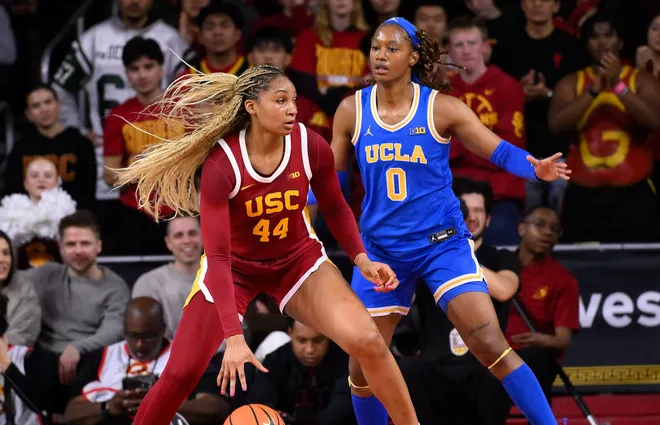
With their second selection in the top four of the 2025 WNBA Draft, the Washington Mystics doubled down on toughness and interior power by picking Kiki Iriafen, a dominant forward out of USC. Known for her relentless rebounding and physicality in the paint, Iriafen is the kind of player who brings immediate grit and edge to a frontcourt—and for a Mystics team retooling for the future, she could become a vital anchor in the post.
Iriafen was a breakout star during her senior season at USC, averaging 19.4 points and 11.2 rebounds per game while shooting over 52% from the field. She was a walking double-double and a major reason why the Trojans were one of the top teams in the Pac-12. Her physical style of play, ability to control the boards, and soft touch around the rim made her one of the most productive bigs in the country.
For Washington, Iriafen fills an immediate need. With Shakira Austin still developing and Elena Delle Donne’s long-term status uncertain, the Mystics needed to bolster their frontcourt with someone who can rebound, defend, and bring energy every night. Kiki fits that role perfectly. She’s strong, active, and doesn’t shy away from contact—traits that will translate well to the WNBA’s physical pace.
What’s even more exciting is Iriafen’s room for growth. She’s already shown flashes of a midrange jumper and can face up against defenders, which adds layers to her game. Her footwork has improved tremendously, and her ability to run the floor in transition makes her a perfect complement in an up-tempo system. If she develops a consistent elbow jumper or stretches her range, she could evolve into a versatile offensive weapon—not just a paint presence.
Coach Eric Thibault now has the building blocks of a rugged, athletic frontcourt pairing in Iriafen and Austin. Together, they could dominate the glass and protect the rim for years to come. Iriafen also brings an infectious motor—she plays every possession like it matters, which sets the tone for teammates on both ends.
Kiki Iriafen isn’t just a great pick—she’s a culture fit. The Mystics didn’t just draft talent; they drafted toughness, leadership, and hustle. And in a league that values both skill and spirit, that combination could be a game-changer.
5. Golden State Valkyries – Justė Jocytė (G, Lithuania)
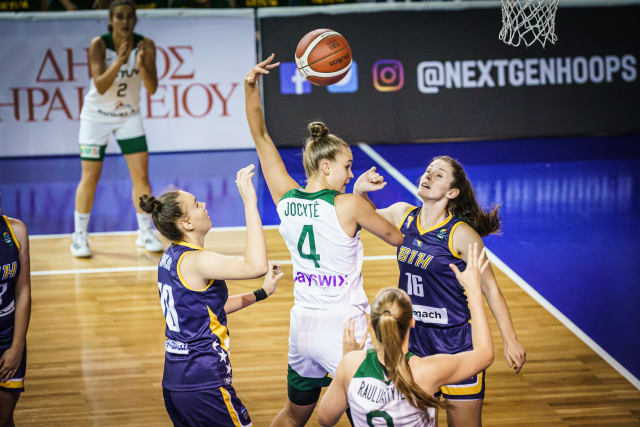
With their first-ever draft selection, the expansion Golden State Valkyries went global, selecting Justė Jocytė, the 19-year-old phenom from Lithuania. A bold and forward-thinking choice, Jocytė immediately brings international star power and untapped upside to the league’s newest franchise. It’s a move that sets the tone for what the Valkyries are building: a future-focused team that isn’t afraid to break the mold.
Jocytė, who played professionally for LDLC ASVEL Féminin in France’s top league, has been on WNBA radars for years. She debuted in EuroLeague competition at just 14 years old, showcasing a rare blend of confidence, maturity, and vision. At 6’1”, she has elite size for a combo guard, and she brings a refined game that’s well beyond her age. Her passing IQ, feel for the pick-and-roll, and smooth jumper make her an immediate asset—even if it takes some time to adjust to the WNBA’s speed and physicality.
For the Valkyries, this pick is about more than just basketball. It’s about establishing identity. Golden State will be playing in the Bay Area, one of the most diverse and internationally connected markets in the country. A young European talent like Jocytė not only gives them a high-ceiling guard to build around but also broadens their appeal globally. She’s poised to be a crossover star, and the Silicon Valley vibes of innovation and growth suit her well.
On the court, Jocytė will likely be paired with veterans who can help ease her transition, allowing her to learn the pace of the WNBA without the pressure of being a savior from Day 1. Expect her to work her way into a lead ball-handler role as she matures. Her ability to create off the dribble, operate in the midrange, and stretch the floor are tools the Valkyries can mold into a future franchise cornerstone.
With Jocytė, Golden State made a pick that says: “We’re building for long-term greatness.” If developed properly, she could become a perennial All-Star. And when the Valkyries eventually make their first deep playoff run, we might look back at this pick as the moment it all started.
6. Washington Mystics – Georgia Amoore (G, Kentucky)
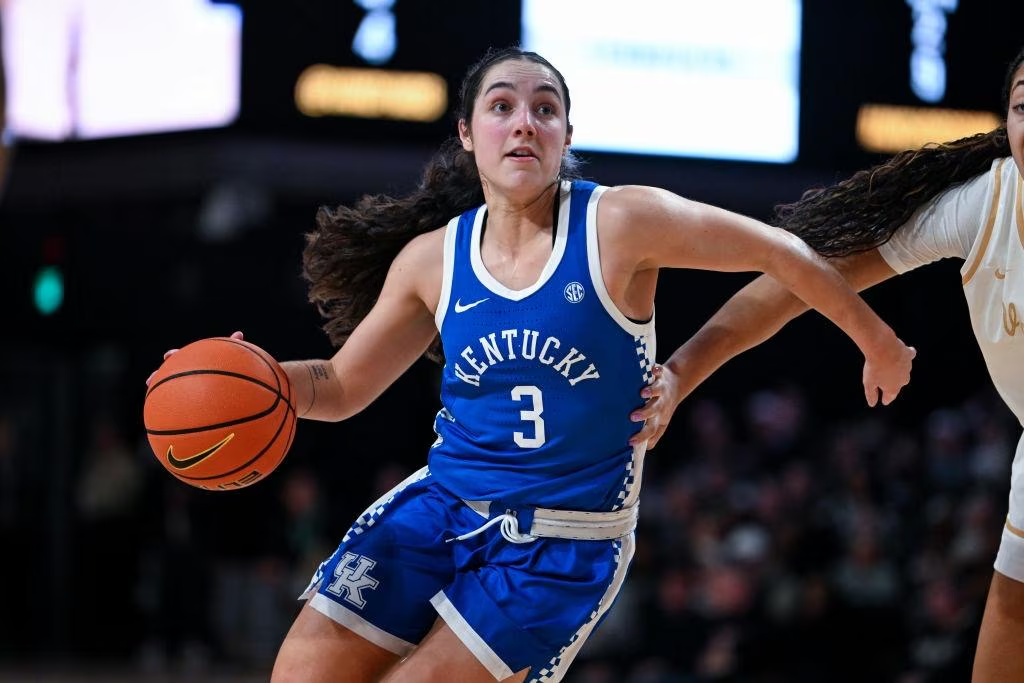
The Washington Mystics continued their loaded first round by selecting Australian-born point guard Georgia Amoore with the sixth overall pick. Coming off a standout college career at Virginia Tech and a grad-transfer season at Kentucky, Amoore brings a combination of leadership, floor spacing, and tempo control that immediately enhances the Mystics’ guard rotation.
Amoore may not have the same household name recognition as some top picks, but her game speaks loudly. She averaged 17.1 points and 5.7 assists during her senior season, showing she can score from deep, create off the bounce, and orchestrate an offense with poise. What sets her apart is her range—we’re talking logo threes, pull-ups in transition, and the confidence to launch when defenders sag. She’s a legitimate three-level scorer, something every modern WNBA backcourt needs.
Washington’s decision to draft both Sonia Citron and Georgia Amoore shows their commitment to reshaping their backcourt with complementary skill sets. While Citron brings length and defensive grit, Amoore offers sharp passing, perimeter shooting, and leadership from the point guard spot. She’s a floor general in the truest sense—able to calm down a possession or push the tempo when needed.
Coach Eric Thibault now has the luxury of plugging in Amoore as either a starter or a dynamic sixth woman, depending on how the roster shakes out. Pairing her with scorers like Shakira Austin and the versatile Citron allows Amoore to focus on facilitating and hitting open shots, two things she does extremely well.
Off the court, she brings a unique perspective as an international player who has adapted to the U.S. college game and thrived under pressure. She’s played in big moments, led tournament runs, and shown she doesn’t shy away from the spotlight. The Mystics value culture as much as talent, and Amoore is known for her professionalism, leadership, and focus—traits that make her a perfect fit in D.C.
In a league where spacing and ball movement are everything, Georgia Amoore fits like a glove. She’s not flashy, but she’s fearless. And if her growth continues on this trajectory, the Mystics might have landed one of the biggest steals in this class.
7. Connecticut Sun – Aneesah Morrow (F, LSU)
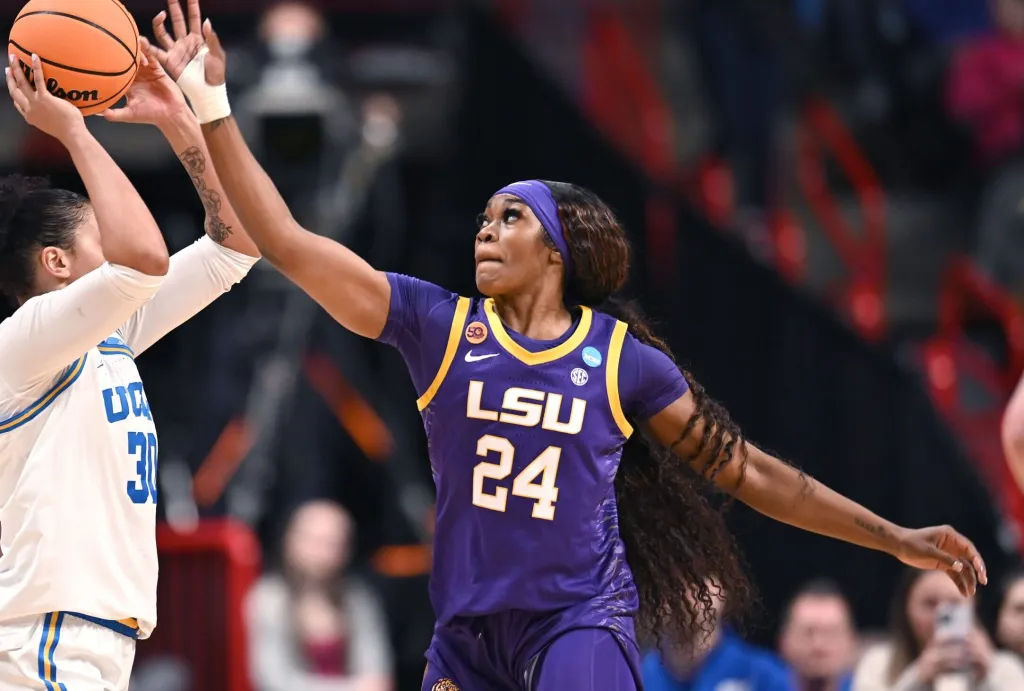
The Connecticut Sun added serious firepower to their frontcourt by selecting Aneesah Morrow, the 6’1” forward out of LSU, with the No. 7 overall pick. Morrow is no stranger to high-level production—she’s been a walking double-double since her freshman year at DePaul and continued her dominance in Baton Rouge under Kim Mulkey’s spotlight.
During her senior season at LSU, Morrow averaged 18.3 points and 10.7 rebounds per game, carving out a reputation as one of the most physical and consistent forwards in the country. Her relentless motor, ability to rebound in traffic, and quick second jump make her a problem on the glass and a force in transition. She doesn’t need plays drawn up for her to impact the game—she creates chaos through effort.
The Sun are in a moment of transition, especially after losing veteran forward Brionna Jones to injury and free agency uncertainty surrounding Alyssa Thomas. Morrow’s arrival gives them a plug-and-play forward who can contribute right away. Her physical style and blue-collar approach match the Sun’s identity perfectly: gritty, tough, and hard-nosed.
Where Morrow fits best is as a small-ball 4 who can crash the glass, defend multiple positions, and clean up around the rim. Her offensive game continues to expand—she’s added a midrange jumper and is working on extending to the three-point line. If that continues to develop, she could stretch opposing bigs out of the paint and become even more dangerous.
Defensively, her instincts are underrated. She gets her hands on deflections, rotates well, and plays with active feet. In the WNBA’s fast-paced style, her agility and ability to guard the perimeter will be crucial.
This pick is also about energy. Morrow brings juice—the kind of passion that ignites a crowd and lifts teammates. She plays like every possession is personal, and in Connecticut’s system, that kind of intensity is contagious.
With this selection, the Sun get a player who not only brings toughness and production, but also fits the franchise’s DNA. Aneesah Morrow might not be the flashiest name in this class, but when the season tips off, don’t be surprised if she’s outworking everyone on the floor.
8. Connecticut Sun – Saniya Rivers (G, NC State)
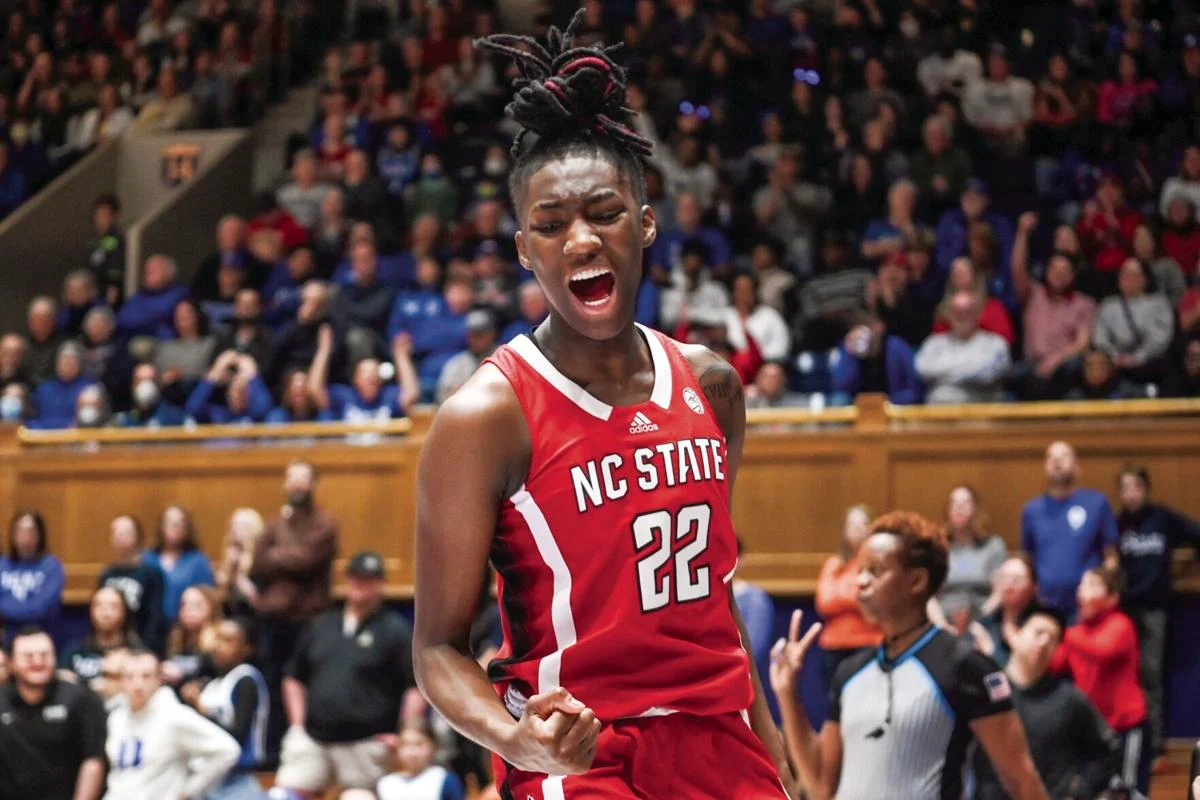
With their second first-round pick, the Connecticut Sun selected Saniya Rivers, a 6-foot guard out of NC State, known for her elite athleticism, disruptive defense, and untapped offensive upside. A former South Carolina recruit turned ACC standout, Rivers emerged as one of the most exciting two-way guards in the nation during her junior season.
Rivers averaged 15.8 points, 5.1 rebounds, and 3.2 assists at NC State while anchoring one of the top defensive units in the country. She’s a nightmare in passing lanes, capable of defending 1-through-3, and thrives in transition. On offense, she’s a slasher who gets downhill with ease, finishes through contact, and creates scoring opportunities off the dribble.
For a Sun team looking to infuse youth and athleticism into their backcourt, Rivers is a high-upside investment. She complements Aneesah Morrow’s interior toughness with perimeter pressure and playmaking. While Connecticut already has veteran guards like Natisha Hiedeman and Tyasha Harris, Rivers gives them something different—length, speed, and defensive versatility.
The key to her WNBA success will be refining her jumper. She shot just 29% from three this past season, but her mechanics are improving, and if she becomes even a league-average shooter, she instantly becomes one of the most dangerous young guards in the league. Her ability to create off the bounce and defend top-tier scorers will keep her on the floor early in her career.
In terms of fit, Rivers can slot into multiple guard combinations. She’s comfortable playing on or off the ball, and her athleticism makes her a sneaky good rebounder from the guard spot—something Connecticut values highly. Her on-ball defense, in particular, could make her a go-to stopper against the league’s elite perimeter scorers.
This is a future-focused pick. Rivers has the raw tools to be great, and in the Sun’s structured, defensive-minded system, she’ll have the chance to sharpen those tools quickly. She’s not just a “project”—she’s a high-energy, high-potential player who can contribute in Year 1 and blossom into a star by Year 3.
Saniya Rivers might be the sleeper of this draft. And if she levels up her offensive game, Connecticut could end up with the steal of the night.
9. Los Angeles Sparks – Sarah Ashlee Barker (G, Alabama)
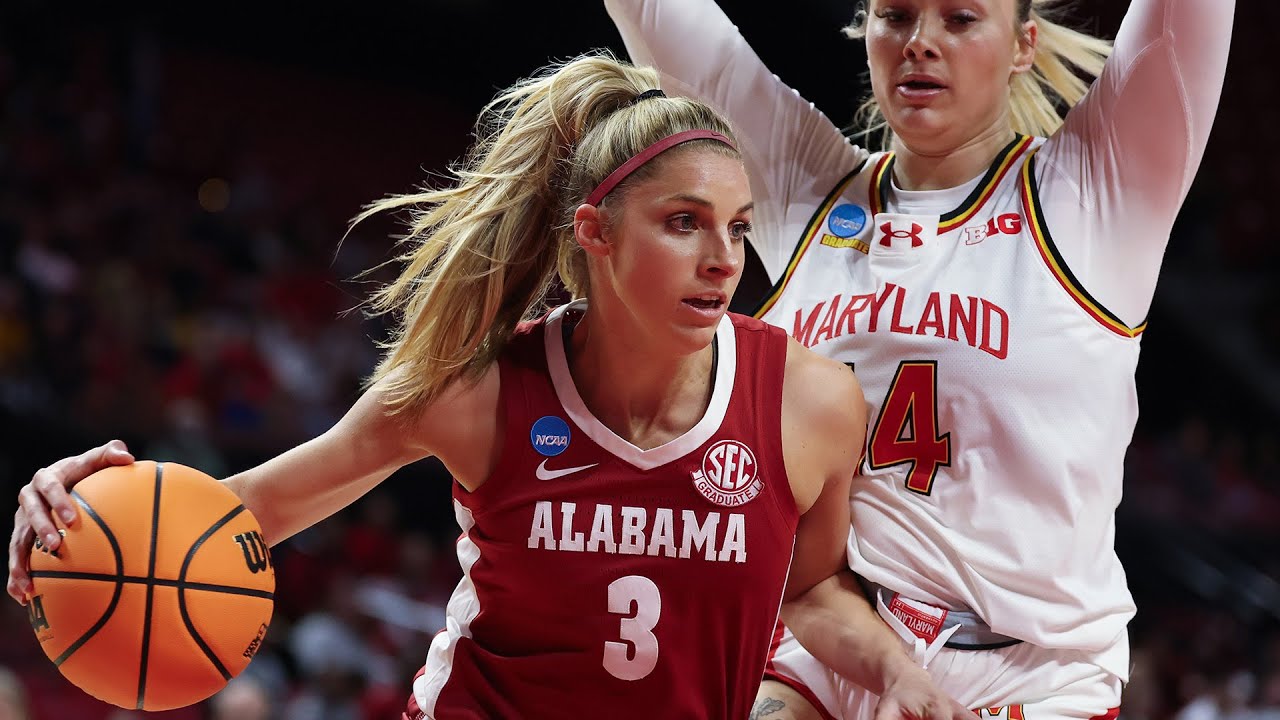
The Los Angeles Sparks used their first-round pick to grab Sarah Ashlee Barker, a tough-nosed, high-IQ guard out of Alabama. While she may not have entered the draft with the same buzz as some others in the class, Barker is the type of player who thrives in the WNBA—unselfish, fearless, and relentlessly competitive.
Barker averaged 16.4 points, 6.2 rebounds, and 3.5 assists per game in her final collegiate season, showing she can do a little bit of everything. She’s not the flashiest scorer, but she’s incredibly efficient, understands spacing, and rarely makes mistakes with the ball. A strong 6-foot guard with a smooth shooting stroke and a college career full of clutch moments, Barker feels like one of those picks that ages really well.
For a Sparks team undergoing major change, this pick adds a steady, reliable piece to their backcourt. LA already has shot creators in Lexie Brown and Zia Cooke, but Barker brings a different vibe—she’s a connector. She moves the ball, cuts well, defends with pride, and crashes the boards like a forward.
Her fit in LA is about versatility. She can play either guard spot, defend wings, and run pick-and-rolls. Her feel for the game and toughness make her a coach’s dream. Plus, she’s a locker room asset—a proven leader who raised Alabama’s ceiling during her time there.
Barker also fits LA’s new identity. The Sparks are rebuilding with a focus on character, culture, and chemistry. Barker checks all three boxes. She’s a grinder who shows up early, does the dirty work, and holds teammates accountable.
If she finds her rhythm from three-point range (she shot 35% her final season), Barker could earn rotation minutes right away. And in a league where injuries test roster depth, having someone like her who can play multiple positions and contribute without needing the spotlight is a huge value.
The Sparks didn’t just draft a solid player—they drafted a glue piece. And if Barker keeps doing what she’s done her entire career, she’s going to be in this league for a long time.
10. Chicago Sky – Ajsa Sivka (F, Slovenia)
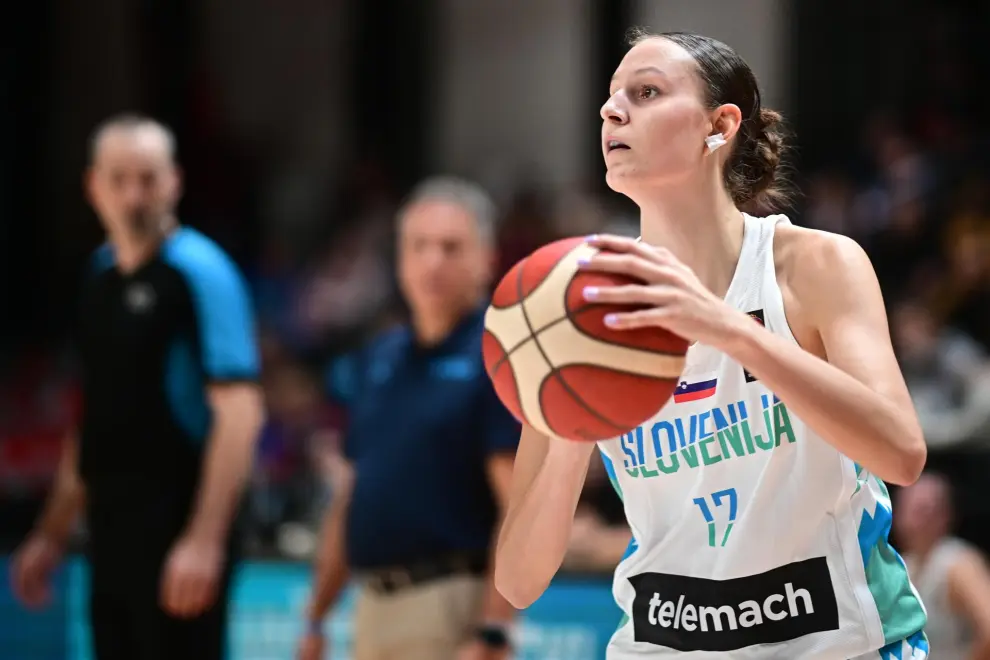
The Chicago Sky continued their international draft trend by selecting Ajsa Sivka, a 6’3” forward from Slovenia, with the 10th overall pick. While not as well-known as some collegiate stars, Sivka has been climbing draft boards thanks to her size, shooting touch, and growth playing against top-tier European talent.
Sivka played for Cinkarna Celje, a Slovenian club known for developing pros, and impressed scouts with her ability to stretch the floor, rebound in traffic, and hold her own defensively against older, more experienced players. She averaged 14.7 points and 8.3 rebounds this past season while shooting 38% from beyond the arc—a big reason why the Sky saw her as a fit for today’s modern forward prototype.
In Chicago, Sivka offers spacing, size, and long-term upside. The Sky are retooling after the departure of key veterans like Kahleah Copper, and Sivka brings a fresh international presence with a lot of room to grow. Her shooting range alone makes her a mismatch in pick-and-pop sets, and if her physicality improves, she could be a dangerous stretch-four option.
What stands out about Sivka is her poise. She doesn’t force plays. She’s patient with the ball, rarely turns it over, and makes smart decisions within the offense. While she’ll need time to adjust to the WNBA’s pace and physicality, her skillset and mentality make her an ideal developmental piece.
Chicago has a strong history of integrating international players into their system, and with Elizabeth Williams and Marina Mabrey likely leading the team’s veteran core, Sivka will have the mentorship she needs to thrive.
Defensively, she’ll need to work on lateral quickness, but her length and rebounding instincts give her solid foundational tools. If she adds muscle and improves her ability to defend in space, she could be a multi-position defender in a few seasons.
This is a long play for Chicago—but a smart one. Ajsa Sivka might not start Day 1, but she could be a sneaky contributor by midseason and a long-term piece that fits perfectly into the evolving style of play in the W.
11. Chicago Sky – Hailey Van Lith (G, TCU)
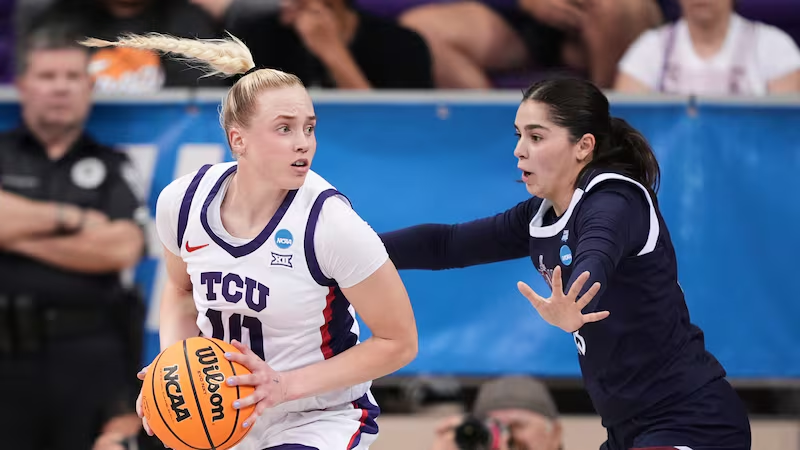
With the 11th overall pick, the Chicago Sky brought some major competitive fire to their backcourt by selecting Hailey Van Lith, the polarizing and ultra-confident guard from TCU. Known as one of the most intense players in college basketball, Van Lith’s journey through Louisville, LSU, and finally TCU has been a rollercoaster—but it’s also a testament to her adaptability, leadership, and relentless work ethic.
Van Lith averaged 15.6 points, 4.2 assists, and 3.9 rebounds per game in her final college season while embracing a lead-guard role in a new system. Her scoring instincts remain her calling card, but it’s her refined playmaking and improved shot selection that made WNBA scouts buy back in. She’s tough, vocal, and plays with an edge that few can match—and that’s exactly the kind of energy the Sky need.
Chicago is undergoing a full identity shift. With Kahleah Copper traded and the franchise building around younger talent, Van Lith steps into a situation where she can immediately contribute while also growing into a leadership role. She’s not shy about the spotlight, and that’s a plus in a market like Chicago, where passion runs deep and expectations are high.
On the floor, she gives Chicago a gritty combo guard who can create offense, hit clutch shots, and set the tone defensively. While she’s a bit undersized at 5’7”, her physicality and confidence help her play bigger than she is. And she’s no stranger to guarding up—she’ll get into the jersey of whoever’s across from her.
There’s also marketability. Van Lith brings built-in visibility to the league. Her social media following, NIL presence, and viral moments make her one of the most recognizable faces in the rookie class. For a team like the Sky, who are looking to re-engage fans, that’s a bonus.
Her development as a facilitator will be key at the next level. If she continues to read defenses and make the right passes out of drives, she could evolve from a scoring guard into a reliable floor leader.
This is a pick that brings heart, hustle, and personality to a rebuilding squad. Hailey Van Lith wants to prove she belongs—and Chicago just gave her the perfect stage.
12. Dallas Wings – Aziaha James (G, NC State)
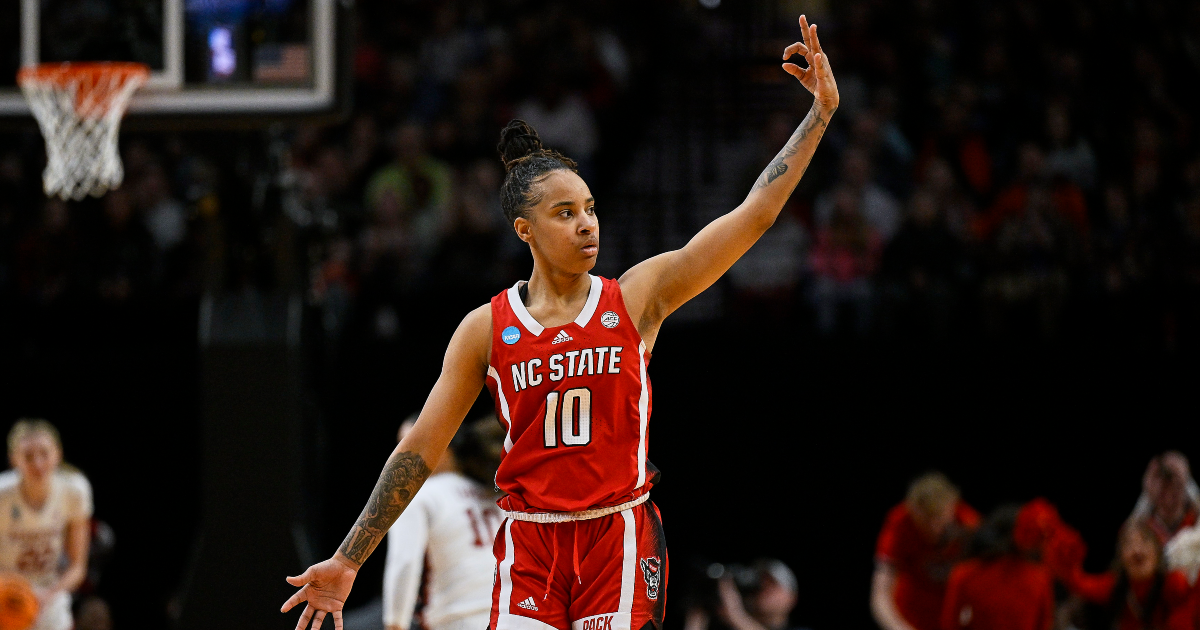
Rounding out the first round, the Dallas Wings grabbed one of the most electrifying players in the country by selecting Aziaha James, the explosive guard out of NC State. After already drafting Paige Bueckers with the No. 1 pick, Dallas doubled down on backcourt scoring with James—a move that could make their offense must-see TV from night one.
James is fast, aggressive, and fearless with the ball in her hands. She averaged 18.1 points, 3.8 rebounds, and 2.6 steals per game in her senior season while shooting nearly 39% from three. Her ability to create her own shot—especially off the dribble—is elite. She’s the kind of guard who can heat up in an instant, pulling up from deep or slicing through defenses with lightning-quick handles.
For Dallas, James brings a jolt of athleticism and swagger to a team that’s ready to turn the corner. Pairing her with Bueckers is an intriguing contrast of styles: Bueckers is the poised playmaker, James is the flamethrower. Together, they could be one of the most dynamic young backcourts in the league, offering a mix of control and chaos that keeps defenses guessing.
This pick also gives head coach Latricia Trammell flexibility. James can be a spark plug off the bench, a scoring weapon in small-ball lineups, or even a defensive disruptor alongside the team’s more seasoned vets. She’s a three-level scorer who also brings a tenacious attitude on the defensive end. Her 2.6 steals per game weren’t just empty stats—she pressures ball-handlers, reads passing lanes, and creates transition buckets.
What will determine her minutes early on is decision-making. At times, she can force shots or get tunnel vision, but in Dallas’ fast-paced, guard-friendly system, she’ll have the space to play through mistakes and learn. If she can improve her shot selection and become a more consistent distributor, she could quickly become one of the steals of this draft.
Aziaha James is pure bucket energy—and Dallas just added her to a young, hungry roster already full of potential. If you’re building a team that wants to push the tempo and light it up? This is the kind of player you bet on.
2025 WNBA Draft First Round: Full Wrap-Up
The 2025 WNBA Draft will go down as one of the most dynamic and globally diverse drafts in league history. From elite NCAA champions to rising European stars, this year’s first round wasn’t just about talent—it was about fit, future, and franchise identity.
Dallas made a clear power move by selecting Paige Bueckers first overall, giving them a generational playmaker to build around. Her pairing with Aziaha James, taken 12th, could be one of the league’s most electric backcourt duos for years to come.
Seattle went international, snagging 19-year-old French center Dominique Malonga, whose combination of rim protection and mobility gives the Storm a new defensive anchor in the post-Sue Bird/Breanna Stewart era.
Washington Mystics crushed the first round with three picks: Sonia Citron (No. 3), Kiki Iriafen (No. 4), and Georgia Amoore (No. 6). Each offers a different strength—Citron’s versatility, Iriafen’s toughness, and Amoore’s playmaking—perfectly positioning the team for a fast rebuild.
Golden State Valkyries, the league’s newest franchise, made a bold international splash with Justė Jocytė at No. 5. She brings European flair, high basketball IQ, and star potential to the Bay, symbolizing the team’s future-forward vision.
Connecticut Sun doubled up on young toughness by adding Aneesah Morrow and Saniya Rivers, a pair of gritty, high-motor players who fit right into the team’s defense-first culture. Morrow’s scoring and Rivers’ disruptive defense give the Sun instant energy and versatility.
Los Angeles Sparks leaned into a culture-first rebuild by selecting Sarah Ashlee Barker, a glue player known for doing the little things right. Her leadership, basketball IQ, and toughness fit perfectly into a developing Sparks roster.
Chicago Sky rounded out the round with two wildly different, but equally impactful picks: Ajsa Sivka, a stretch forward from Slovenia with size and shooting potential, and Hailey Van Lith, the fierce, clutch guard from TCU who brings intensity and swagger to a reenergized franchise.
This draft didn’t just bring talent—it brought personalities, brands, and culture-shifting pieces. From Bueckers to Jocytė to Van Lith, the WNBA just got a lot deeper—and a whole lot more fun.


